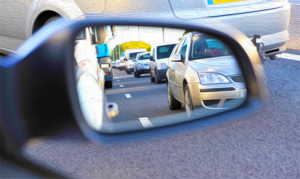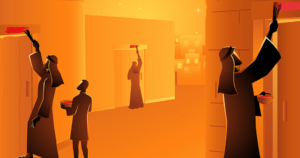Rubbernecking Others’ Tragedies
Have you ever been caught in freeway traffic, only to later discover that it was due to an auto accident down the road, and that all the drivers had slowed down to “rubberneck,” that is, to gaze for a few moments at what happened? It’s annoying, but we all do it. In trying to understand why we do it, one person wrote: “It is rooted in profoundly human instincts and feelings of curiosity, shock, and empathy… Carl Jung believed that human beings enjoy witnessing violence.
 He maintained that this is a way to entertain our most destructive impulses without actually harming ourselves or others in the process.” We suggest that part of our fascination in others’ tragedies is a response to the subconscious anxiety we experience when seeing an accident: “There but for the grace of God go I.” That could have been me, and I’m subconsciously relieved it was the other guy instead.
He maintained that this is a way to entertain our most destructive impulses without actually harming ourselves or others in the process.” We suggest that part of our fascination in others’ tragedies is a response to the subconscious anxiety we experience when seeing an accident: “There but for the grace of God go I.” That could have been me, and I’m subconsciously relieved it was the other guy instead.
We take great pride when reading the section of the Haggadah which talks about how God not only redeemed us from Egypt, but did so by Himself, not via proxy:
וַיּוֹצִאֵנוּ ה’ מִמִּצְרַיִם. לֹא עַל־יְדֵי מַלְאָךְ, וְלֹא עַל־יְדֵי שָׂרָף, וְלֹא עַל־יְדֵי שָׁלִיחַ, אֶלָּא הַקָּדוֹשׁ בָּרוּךְ הוּא בִּכְבוֹדוֹ וּבְעַצְמוֹ
“And the Lord took us out of Egypt” – not through an angel, and not through a seraph, and not through a messenger, but [directly by] the Holy One, blessed be He, Himself.
The angel of death
The Hagaddah demonstrates this from a verse in our parsha (12:2) which emphasizes the idea of “אֲנִי יְקֹוָק” – it is I, God Himself, who is redeeming you from Egypt. And yet, the very same chapter of the Torah contains a verse which implies the exact opposite. In telling the Jewish people to paint their doorposts with paschal blood on the night of the Plague of the Firstborn, the Torah then exhorts (12:22), “וְאַתֶּם לֹא תֵצְאוּ אִישׁ מִפֶּתַח־בֵּיתוֹ עַד־בֹּקֶר”- “No person may leave their front door until morning.” Why couldn’t the Jews walk outside during the plague? Rashi, quoting the very same Sages who wrote the Hagaddah states: “We learn from here that once permission is granted to God’s destroyer angel, he does not distinguish between the righteous and the wicked.”
So which is it, God Himself or His angel of death? If God Himself redeemed us from Egypt, then what’s wrong with walking outside? Can’t God Himself distinguish who is Jewish and who is Egyptian? Furthermore, even if Hashem sent some kind of angelic proxy to bring about the death of the firstborn, where is the justice in killing righteous and wicked alike? What kind of lesson is this for the offspring of Avraham, who was always taught that Hashem is a righteous and just God?!
While there are a number of commentaries who address this gaping contradiction, a comment from the Zohar is most meaningful. “Whenever Divine justice is being meted out, a person should stay indoors” and not gaze at the overt retribution.
Spared for a reason
 The Zohar provides three biblical examples, which at first glance don’t appear connected: (1) God required Noah to seal himself in an Ark when the rest of the world was being destroyed. (2) When Lot and his family were fleeing from the destruction of Sodom, the angels told Lot and his family that they could not turn around and look at the destruction. (3) When the Jews were being saved from the Plague of the Firstborn, they were commanded to not leave their homes, so as not to look upon all of the Egyptian carnage.
The Zohar provides three biblical examples, which at first glance don’t appear connected: (1) God required Noah to seal himself in an Ark when the rest of the world was being destroyed. (2) When Lot and his family were fleeing from the destruction of Sodom, the angels told Lot and his family that they could not turn around and look at the destruction. (3) When the Jews were being saved from the Plague of the Firstborn, they were commanded to not leave their homes, so as not to look upon all of the Egyptian carnage.
All three of these episodes share something very important in common. Each one of the parties being saved – Noah, Lot, and the Jewish people in Egypt – were not being saved on their own merit.
Rather, these were overall good, yet flawed, human beings who were being spared by Divine decree. (1) Noah was spared in order to perpetuate mankind, but would not have deserved to be saved from the Flood on his own merit. (2) Lot was only saved from Sodom’s destruction because he was Avraham’s nephew. (3) The Jewish people, at this stage of their development, were pagans who had not yet received the Torah, and were not yet meritorious enough to deserve a miraculous salvation for their own sake. God saved them because of his covenant with their ancestors and because of His foreknowledge that they would become a great people in the future.
A new faith at the Red Sea
Rav Yaakov Etlinger (19th cent.) noted a very interesting evolution of the Jewish people during their Exodus process. Bnei Israel only sang to God after the Splitting of the Red Sea, because they were granted the privilege of seeing the Egyptians perish. Why were they allowed to witness this carnage only now, whereas before, they were not permitted to witness the Egyptians’ death during the Plague of the Firstborn? Something new developed within the Jews’ faith in God after the Red Sea’s splitting. Until that moment, they still harbored doubts about God and His ability to save them.
Because of this lingering lack of faith, they were not sufficiently different from the Egyptians, and thus were not granted the opportunity to see their enemies fall. But after the splitting of the Red Sea, the Torah testifies (14:31), “וַיַּאֲמִינוּ בַּיקֹוָק וּבְמֹשֶׁה עַבְדּוֹ” – “They completely believed in Hashem and in Moshe, His servant.” They were then granted the right to witness the complete elimination of their persecutors.
The Midrash quoted above stated that once the “destroyer angel” is granted permission to destroy, it does not distinguish between the righteous and the wicked. What it really means, according to this Zohar, is that even when Hashem Himself is meting out the punishment, those righteous (i.e., righteous in comparison to those being punished) who are being saved – such as Noah, Lot, and the Jewish people in Egypt – do not have a right to gaze upon their fellow human beings’ suffering, so long as they are not substantively different from them.
If they do, then they are deemed guilty, and deserve the same punishment. This helps resolve the contradiction over whether it was God Himself or an angel, and where the justice is in this system.
Overcoming unhealthy insecurities
 We all have an instinct, due to our own insecurities about our mortality, to be curious when we hear about others’ tragedies. When someone tragically dies young, for some, the first question is, “What happened? How did they die?” We don’t consciously mean to be petty and intrusive, but the alarms go off in our minds: “They’re not much older than me. If it could happen to them, what will be of me?!”
We all have an instinct, due to our own insecurities about our mortality, to be curious when we hear about others’ tragedies. When someone tragically dies young, for some, the first question is, “What happened? How did they die?” We don’t consciously mean to be petty and intrusive, but the alarms go off in our minds: “They’re not much older than me. If it could happen to them, what will be of me?!”
We seek to reassure ourselves that whatever circumstance brought about their tragedy will not be relatable to ourselves. But deep down, we know that what happened today to them, could, God forbid, happen to any of the rest of us.
It’s an instinct that we should try to overcome. It’s not coming from a healthy place, but rather from a place of insecurity. It’s that anxiety which causes some of us to say foolish things at a shiva house. Things like: “Which bus line hit him?” “I didn’t know she was so sick! My wife saw her at the market just the other day and she looked fine!” “Was he a smoker?” “Did he have good life insurance?” When we hear of a tragedy, we should instead express sympathy, care, and suppress our curiosity-motivated questions. In other words, we should leave the blood-stained “front door” of our prying eyes closed.
This was such a fundamental lesson to the Jewish people in their early formation. If so, it seems to be vital to our identity as God’s people. It is part of our national character to be compassionate and caring. Suppress your curiosity and rubbernecking, and just be there for your friend who could use your support without your curious questions.
May we all have the fortitude of character to support each other in our times of need, so that we travel together with our heads held high toward the Redemption, bb”a.

